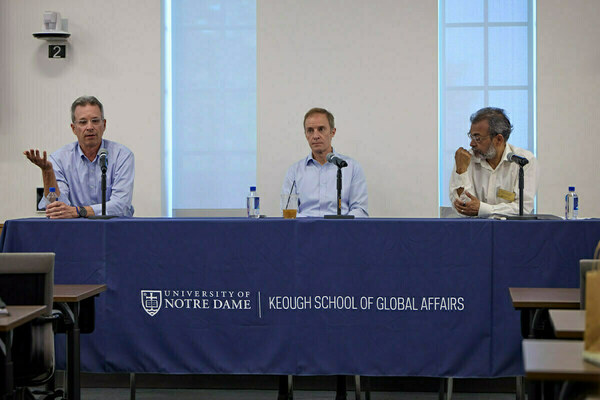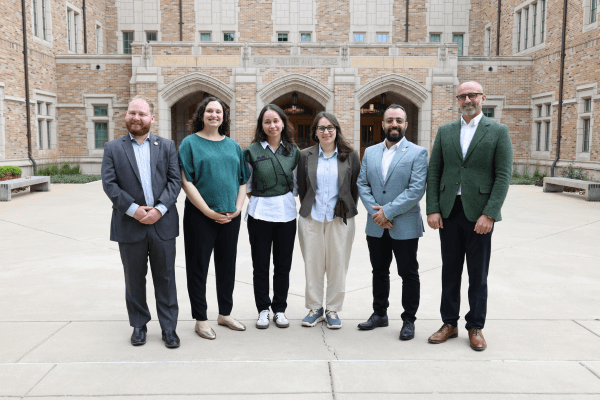White Group Publishes a New Method to Identify pH-dependent Cell Process Pathways

Small changes in intracellular pH (pHi) regulate normal cell behaviors such as cell movement, cell division, and differentiation to ensure that biological processes occur normally, but dysregulation of pHi has been implicated in diseases such as cancer and neurodegeneration. Therefore, determining the nature and mechanisms of pHi dysregulation is an important step in developing better treatment options for these diseases.
At a molecular scale, pH-dependent biological processes are mediated by proteins, called pH sensors, that respond to small changes in pHi. Traditionally, identifying pH sensors and pHi-sensitive pathways has taken a reverse approach, starting with a biological outcome and then working backward to identify essential pathways, followed by determining individual proteins with pHi-sensitive functions. Testing each pathway and protein one by one is an extremely labor- and time-intensive process. Thus, a comprehensive molecular understanding of how pHi changes cell behaviors has been elusive.
A new paper from the laboratory of Katharine White, Clare Boothe Luce Assistant Professor in the Department of Chemistry and Biochemistry, published in the Journal of Biological Chemistry (2024, vol. 300, article 107658) reports an experimental platform that addresses this challenge through a more efficient method to determine the molecular mechanisms driving pHi-dependent cellular processes. Using an -omics based approach on normal human breast epithelial cells, White was able to identify thousands of genes that were regulated by pHi in a vastly reduced time relative to previous methods.
After narrowing the focus to a smaller subset of genes (176) that exhibited increased or decreased expression due to changes in pHi, the White Lab discovered that the genes clustered in a small number of cellular pathways including signaling and metabolic pathways. They showed that changing pHi could alter cell signaling and metabolism and discovered that, importantly, increasing pHi in normal breast epithelial cells drove them to become more cancer-like. At high pHi, the normal cells increased activity of a signaling pathway called Notch, that leads to cell overgrowth and is associated with tumor formation. When pHi was raised in the normal breast cells, they showed a metabolic signature called Warburg metabolism that is found in patient cancers.
Speaking about the findings, White said: “One of the biggest challenges for researchers is how to specifically target diseased cells while leaving normal cells unaffected. Our work shows which pHi-dependent pathways may be good therapeutic targets for more selective and effective treatments.”
This research imparts important advances in the molecular understanding of how dynamic pHi regulates normal biological responses. It identifies appropriate pathways to investigate for therapeutic targeting of pHi in cancer and neurodegeneration, opening the door for more effective disease treatment.
Originally published by at chemistry.nd.edu on November 11, 2024.
Latest Research
- Energy experts: a sustainable U.S. future calls for a balanced approach…
- In Tandem: What an art historian and chemist learned by teaching a class togetherHow do you bridge the gap between two drastically different fields? For a Notre Dame art historian and chemist, all it took was sharing a classroom for…
- Kroc Institute welcomes six new Ph.D. students, names fellowship recipientsThe fall 2025 semester saw the arrival of six new doctoral students at the Kroc Institute for International Peace Studies, part of the Keough School of Global Affairs. Four of the incoming students make up the first cohort of the newly launched international peace studies doctoral program, with the…
- Researcher shows how immigration policy can strengthen opportunityAmy Hsin wants policymakers and the public to understand how immigration policy choices create barriers that limit opportunity. How do these structural forces hinder people from pursuing education, securing good jobs and planning for the future? And what might better alternatives look like?
- Notre Dame School of Architecture poised for global leadership through historic investmentThe $150 million gift represents an unprecedented commitment in the 160-year history of American architectural education. In recognition of this landmark gift, the school will be renamed the Matthew and Joyce Walsh School of Architecture at Notre Dame.
- Notre Dame faculty receive prestigious early career awards from the National Science FoundationDuring the 2024-2025 academic year, four researchers in the University of Notre Dame’s Colleges of Engineering and Science received early career awards from the National Science Foundation (NSF). The Faculty Early Career Development (CAREER) Program is one of the NSF’s most prestigious awards…













